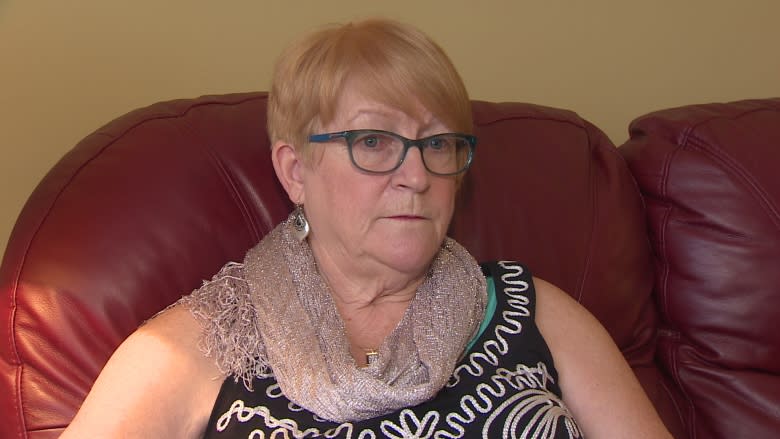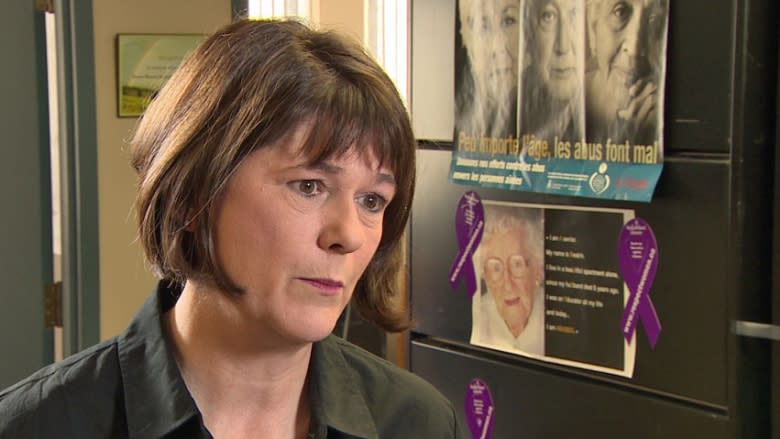Golden years, but dark housing prospects for some seniors
As she enters her golden years, Joan Dunphy may have to go back to work to afford a roof over her head — and she’s not the only senior to find herself in a tough housing situation.
Dunphy, 67, qualifies for subsidized housing. But the problem is that there's no rental unit available for her.
She was living in an apartment, but can no longer afford it. About 60 per cent of her net income goes for rent, heat and light. That’s double the recommended amount.
“I’m at the point now where my savings are gone and I can't afford this any more so I have to move,” Dunphy told CBC Investigates.
“I went see my family doctor, and my blood pressure was up. I've never had a problem with blood pressure. And she said to me, she said, ‘You have to make some changes.’ So I thought, ‘Well, what am I going to do? I'm going to be on the street.’”
Dunphy approached Newfoundland and Labrador Housing for a subsidy and was approved as a low-income senior.
But she says her landlord balked. “They weren't going to have any more rentals that are subsidized.”
Housing corporation rules tie the subsidy to a location, not the person renting it.
“They have to decide where you live,” Dunphy said. “It doesn't matter where you are or how you're settled. If they're going to subsidize you, it has to be in a place that they subsidize.”
Right now, she says, there are no such places available.
So Dunphy went looking on her own.
She found a place that costs less, but it doesn't qualify for a subsidy.
That doesn’t make sense to her.
“If I am eligible for a subsidy myself, why can't I pay my rent and then Newfoundland Housing can say: 'Did Mrs. Dunphy pay her rent this month?' 'Yes.' ‘OK, send me the subsidy.’ If the subsidy is for me, then subsidize me.”
'Only the tip of the iceberg'
The Seniors Resource Centre of Newfoundland and Labrador says it had nearly 400 calls from seniors about housing situations during the last fiscal year.
In fact, for the first time, housing-related calls were the number one area of inquiry, according to executive director Kelly Heisz.
“We’re only the tip of the iceberg, because being a non-profit, we don’t advertise a lot,” Heisz said.
The centre provides advice and hooks up seniors with government programs.
“For a lot of seniors, housing crisis means that their whole living expenses have been uncontrollable, which spirals to the point that a lot of seniors just get so anxious, and have anxiety, that they really don't know what to do,” Heisz said.
She says a typical one-bedroom apartment which would have gone for between $450 and $650 a decade ago now has a price tag of over $1,000.
“Ideally, if a senior wants to stay where they are, well why can’t we work to try to have them stay where they are?” Heisz said.
NDP MHA Gerry Rogers also gets calls. She believes seniors should be able to choose where they want to live, within reason.
“B.C. has a very interesting housing program that's specifically for seniors,” Rogers said. “It's a program where they get rent supplements. The rent supplement goes with the person, it doesn't go to the unit specifically.”
Clyde Jackman is minister of the newly-created Department of Seniors, Wellness and Social Development. He is also responsible for the housing corporation.
He says there have been success stories, such as affordable housing units built on the Burin Peninsula.
“How we get to providing more of these, and providing more home-care support to keep people in their homes is essential, and that’s where we’ve got to go,” he said.
Jackman acknowledges that “creative options,” such as possibly shifting subsidy dollars to a person instead of a specific location, could be considered.
“If someone independently goes out and finds their home, I think it's something certainly worth looking at,” he said.
'It's pretty scary'
Joan Dunphy has been retired for a decade, but now says she is faced with just one choice.
“It's a really awful feeling to think that in my golden years — I've worked all my life — and now in my golden years, I have to go to work,” she said.
“I have to move to Pouch Cove, which is away from my children and grandchildren, a very important part of my life.”
Dunphy says she has medical problems and will try to get a job where she doesn’t have to be on her feet too much.
Part-time work, she says, will help her make it through month to month.
“It's pretty scary.”
That apartment in Pouch Cove isn't ready for Dunphy to move into yet.
She’s staying with her daughter while she waits.





